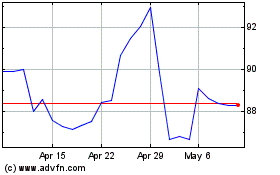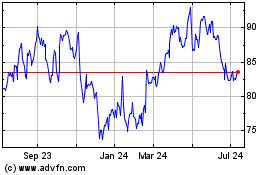Chesapeake Warns On Risk to Business From Sagging Oil Prices
November 05 2019 - 12:10PM
Dow Jones News
By Andrew Scurria, Alexander Gladstone and Carlo Martuscelli
Chesapeake Energy Corp. said it may be unable to stay in
business if oil and natural gas prices remain depressed,
underscoring the challenges faced by drillers still trying to
regain their footing from when commodity prices collapsed in 2014
and 2015.
The Oklahoma City-based company said Tuesday there was
"substantial doubt" about its ability to continue as a going
concern if oil and gas prices don't rise. Chesapeake said certain
terms of its loan agreements will tighten gradually over the next
four quarters, heightening the likelihood of a debt default.
"We are actively pursuing with support from the board of
directors a variety of transactions and cost-cutting measures,"
including reducing discretionary spending, debt refinancing, asset
sales and reduced capital expenditures, Chesapeake said in a
securities filing.
Chesapeake, co-founded by the late wildcatter Aubrey McClendon
and best known for its trailblazing push to extract natural gas
from shale formations, said it had $9.13 billion in long-term debt
as of Sept. 30.
A $1 billion Chesapeake convertible senior note due in 2026
traded at 52 cents on the dollar on Tuesday, down five points from
the prior day's close of 57, while a $451 million senior note due
in 2022 changed hands at 77 cents, down from 82 cents, according to
MarketAxess.
Chesapeake shares were down 13.5% Tuesday morning at $1.34 and
have lost 54% of their value in the past 12 months.
The company has been shifting capital expenditures to oil
production, betting on crude as the key to a more profitable
future. Chesapeake's move to oil came relatively late compared with
many of its peers, which were quicker to anticipate that a glut of
natural gas in the U.S. would make crude more attractive.
The company on Tuesday also posted a quarterly loss of $61
million, or 6 cents a share, compared with a loss of $146 million,
or 19 cents, for the same period a year earlier.
Sales fell to $2.06 billion from $2.42 billion. Daily production
in the third quarter averaged at about 478,000 barrels of oil
equivalent a day, the company said.
Chesapeake also said it is looking to achieve positive free cash
flow in 2020. The company said it is lowering its capital
expenditure forecast by about 30% in 2020. It is also looking to
lower 2020 production and general and administrative costs by about
10%.
In the fourth quarter, the company said it expects oil
production to grow 10% compared with the third quarter.
Despite strong economic indicators in the U.S., energy investors
remain concerned that a slowing global economy will hurt demand for
crude and fail to make a meaningful dent in inventories. Recent
oil-demand forecasts from the International Energy Agency have
helped sour investors' outlook on crude, coupled with downbeat
manufacturing numbers from around the world and persistent trade
tensions.
Sarah Toy and Rebecca Elliott contributed to this article
Write to Andrew Scurria at Andrew.Scurria@wsj.com and Alexander
Gladstone at alexander.gladstone@wsj.com
(END) Dow Jones Newswires
November 05, 2019 11:55 ET (16:55 GMT)
Copyright (c) 2019 Dow Jones & Company, Inc.
Chesapeake Energy (NASDAQ:CHK)
Historical Stock Chart
From Mar 2024 to Apr 2024

Chesapeake Energy (NASDAQ:CHK)
Historical Stock Chart
From Apr 2023 to Apr 2024
